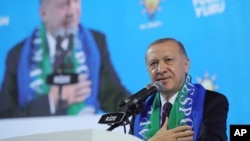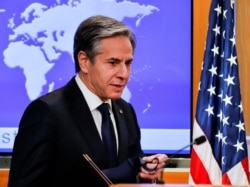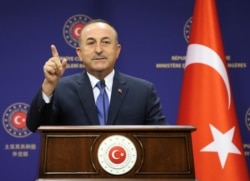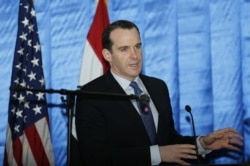Turkish President Recep Tayyip Erdogan has accused fellow NATO ally the United States of supporting terrorists in the wake of the deaths of 13 kidnapped Turks in northern Iraq. He also said a U.S. statement about the killings, which Ankara blamed on Kurdish militants, was a joke.
"You [the U.S.] said you did not support terrorists, when in fact you are on their side and behind them," Erdogan said Monday in comments to supporters. By terrorists, he was referring to the Kurdistan Workers Party, or PKK, which has been waging a decadeslong insurgency inside southeastern Turkey.
Erdogan spoke one day after a U.S. State Department spokesman said in a statement that if the reports of the deaths of Turkish civilians at the hands of the PKK are confirmed, “we condemn this action in the strongest possible terms.” The U.S., European Union and Turkey consider the PKK a terrorist organization.
Later Monday, the spokesman said in another statement that Secretary of State Antony Blinken had spoken by phone with Turkish counterpart Mevlut Cavusoglu. The statement said in part, “The Secretary expressed condolences for the deaths of Turkish hostages in northern Iraq and affirmed our view that PKK terrorists bear responsibility.”
Separately, the Turkish Foreign Ministry said it summoned the U.S. ambassador, David Satterfield, to lodge "in the strongest possible terms" Ankara's displeasure with Washington's refusal to accept Turkey's version of events immediately.
Turkish Defense Minister Hulusi Akar said Sunday the bodies were discovered in the Gara region, near the Turkey-Iraq border, during an operation against the PKK in which Turkish forces killed 48 militants. The bodies were found in a cave complex.
A statement on a PKK website said it was holding prisoners of war, including Turkish intelligence, police, and military personnel, and that they were killed due to the fighting.
Analysts say the diplomatic dispute between the NATO allies brings to fore simmering tension over Washington's support of the YPG, a Syrian Kurdish militia, in its war against Islamic State. Ankara accuses the YPG of being affiliated with the PKK.
"Fighting the PKK became the principal occupation of the Turkish military," said international relations professor Serhat Guvenc of Istanbul's Kadir Has University. Around 40,000 people have died in the PKK's fight for greater minority rights in Turkey.
Washington maintains that the YPG is separate from the PKK, but Ankara is demanding that the U.S. administration decide where its loyalties lie.
"The U.S. has to give a final decision. If they continue with the PKK in the region [Syria] or with Turkey, this is a most difficult question," said Turkish presidential adviser Mesut Casin, who is also with Istanbul's Yeditepe University.
Analyst Guvenc says Ankara is nervous over the stance U.S. President Joe Biden will take toward the YPG. Biden served as vice president under Barack Obama, whose administration took the step to militarily back the YPG against the Islamic State group.
"We see a good number of those people in Obama's team will be part of the new administration in foreign and military positions who support the YPG policy," said Guvenc. "This must be a major source of concern for Ankara. They will be dealing with people they don't like. Like this special envoy McGurk, his appointment has sent a very strong signal of what is in the offing."
Guvenc was referring to Brett McGurk, who served as a special envoy for Syria during the Obama administration. Cavusoglu accused McGurk of being a PKK supporter while in the region.
McGurk is now the White House coordinator for the Middle East and North Africa.
Some observers note that since Biden won election in November, he has yet to speak with Erdogan, a sign of how complex and complicated bilateral relations remain.
"It is hard to see how either party will manage to walk around this minefield," said former senior Turkish diplomat Aydin Selcen, who served in Washington. He added, "Firm transactionalism is the new buzzword to depict and predict the Biden administration's approach towards Turkey."
Analysts point out Erdogan is famed for balancing fiery rhetoric with pragmatism and transactionalism. But the Turkish president Monday said relations with its NATO allies have reached a critical moment.
"After this, there are two options. Either act with Turkey with no if’s or but’s, without question, or they will be a partner to every murder and bloodshed," he said." The terrorist organization on our doorstep, on our borders, is killing innocents."







